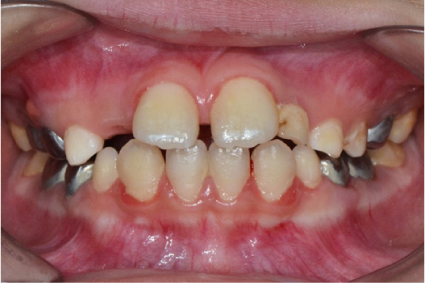J Dent Anesth Pain Med.
2016 Sep;16(3):213-216. 10.17245/jdapm.2016.16.3.213.
Dental treatment under general anesthesia in an intellectually disabled child with intellectually disabled parents
- Affiliations
-
- 1Department of Pediatric Dentistry and Dental Research Institute, School of Dentistry, Seoul National University, Seoul, Korea. snmc94@snu.ac.kr
- KMID: 2354658
- DOI: http://doi.org/10.17245/jdapm.2016.16.3.213
Abstract
- Children with an intellectual disability often demonstrate lack of cooperation during dental treatment and require behavioral management. A child with mild intellectual disability can be managed adequately using restraints and medication. However, in cases of profound intellectual disability, dental treatment under general anesthesia is usually required. In cases where the patient is an intellectually disabled child who has intellectually disabled parents, it is difficult to evaluate the patient's preoperative condition and to obtain consent for treatment under general anesthesia. Furthermore, they are unable to respond to emergencies after treatment. Therefore, dental treatment should be performed under general anesthesia with hospitalization for children with an intellectual disability. This case presents the dental treatment of an intellectually disabled child, who has intellectually disabled parents, and who required general anesthesia and hospitalization.
MeSH Terms
Figure
Reference
-
1. Liddell A, Rabinowitz FM, Peterson C. Relationship Between Age Changes in Children's Dental Anxiety and Perception of Dental Experiences. Cognit Ther Res. 1997; 21:619–631.2. Wang YC, Lin IH, Huang CH, Fan SZ. Dental anesthesia for patients with special needs. Acta Anaesthesiol Taiwan. 2012; 50:122–125.
Article3. Feldman MA, Walton-Allen N. Effects of maternal mental retardation and poverty on intellectual, academic, and behavioral status of school-age children. Am J Ment Retard. 1997; 101:352–364.
Article4. Feldman MA, Case L. Teaching child-care and safety skills to parents with intellectual disabilities through self-learning. J Intellect Dev Disabil. 1999; 24:27–44.
Article5. Brown JP, Schodel DR. A review of controlled surveys of dental disease in handicapped persons. ASDC J Dent Child. 1976; 43:313–320.
Article6. Tesini DA. Age, degree of mental retardation, institutionalization, and socioeconomic status as determinants in the oral hygiene status of mentally retarded individuals. Community Dent Oral Epidemiol. 1980; 8:355–359.7. Dougherty N. The dental patient with special needs: a review of indications for treatment under general anesthesia. Spec Care Dentist. 2009; 29:17–20.8. Wisiak UV, Kröll W, List W. Communication during the pre-operative visit. Eur J Anaesthesiol. 1991; 8:65–68.
Article9. Campbell AG. Infants, Children, and Informed Consent. Br Med J. 1974; 3:334–338.
Article
- Full Text Links
- Actions
-
Cited
- CITED
-
- Close
- Share
- Similar articles
-
- Airway management during general anesthesia in an intellectually disabled patient with undiagnosed tracheomalacia
- Effect Site Concentrations of Propofol for Dental Treatment under Deep Sedation in Intellectually Disabled Patients
- Use of ADMSâ„¢ during sedation for dental treatment of an intellectually disabled patient: a case report
- A Survey of the Outpatient General Anesthesia and Dental Treatment in Chungnam Dental Clinic for the Disabled
- Immediate implant placement for schizophrenic patient with outpatient general anesthesia



